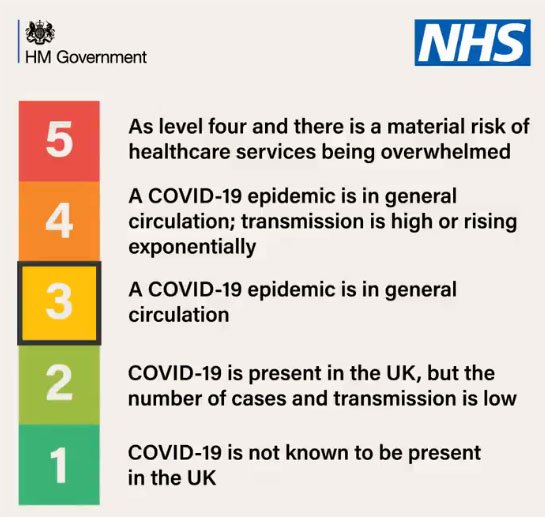Back to basics. Poor administration and its consequences
How Covid-Alert are you? Or, put another way, without checking, can you tell me what the current Covid Alert Level is? And without checking, can you tell me what that alert level means? I expect that most of you will have proven unalert by that measure.*
It was supposed to be a touchstone measure. When Boris Johnson addressed the nation on 10 May, the introduction of the Covid Alert Level System was his central point. Let me remind you of his words:
“And to chart our progress and to avoid going back to square one, we are establishing a new Covid Alert System run by a new Joint Biosecurity Centre.
And that Covid Alert Level will be determined primarily by R and the number of coronavirus cases.
And in turn that Covid Alert Level will tell us how tough we have to be in our social distancing measures – the lower the level the fewer the measures.
The higher the level, the tougher and stricter we will have to be.”
Bearing this in mind, you would have thought that the government would be referring daily to the Covid Alert Level as a reference point for determining how tough it has to be in determining social distancing measures.
So far as I can tell, the last time it was mentioned in any government release of any kind was on 19 June. The Education Secretary, who has adopted the protonym Beleaguered, has not used it to justify his decisions on reopening schools. It was not used to justify the decision to reopen pubs, nail bars or gyms. So as a matter of fact, the Covid Alert Level is not being used to tell government how tough it has to be in social distancing measures. Indeed, even checking the current Covid Alert Level is not particularly straightforward. It has quietly fallen into desuetude.
There are three possibilities what has happened, and all of them would be damning of the government. First, the criteria for the alert level system may have been badly drawn up. When applied to the practicalities of managing social distancing in a complex economy, it came up short. If so, the machinery of government, and those presiding over its administration, failed on a central policy initiative through incompetence. Or secondly, the government may have proven incapable of managing a coherent communications strategy on by far its greatest challenge of the moment. Or thirdly (and this is my own view), it’s a lot of both.
This is not an aberration for this government, but the norm. It blundered into the fiasco about exam grades, even after being given a week’s warning by the problem erupting in Scotland (the problem seems in essence to be derived from no one at any level giving any thought to the purpose of giving these gradings). It trumpeted the development of a “world-beating” track and trace app that it had to abandon. At every stage, it has dithered, backtracked and waffled about whether and where we should wear facemasks.
Does any of this matter? Well, if you’re worried about the public suffering needless anxiety, confusion, increased economic uncertainty and the reduction in trust in government, it probably does. However, as opinion polls show, mere crushing incompetence is not enough to persuade a large chunk of Conservative supporters that other options may be preferable. A steady 40+% of the population remain in the blue column, despite the government lurching from pratfall to pratfall and avoidable disaster to avoidable disaster. They are happy to be led by a flag-waving ninny with a watermelon smile.
For now, we can deduce that the norms of good, or even adequate, administration no longer matter sufficiently to many voters to change their votes (probably the great majority, when one considers that many Labour supporters are just as tribal). This has consequences.
First, we should not expect opinion polls to move all that much for the while, no matter how chaotic things get – the country has shrugged off tens of thousands of deaths unnecessarily caused by this government’s actions and inactions, so don’t expect scales to fall from loyalists’ eyes any time soon.
Next, with there no longer being any great alignment between good governance and political success, the government will see itself as free to look after its own interests rather than sharpen up its act. So career civil servants will take the rap for blunders while loyal if feckless ministers and apparatchiki are coddled. Friends will be lavished. Outrage will be ignored. This has already started. It will only accelerate.
Perhaps you would like to see the country run better. Well, you’ve come to the wrong place. For now at least, Britain’s dominant political force is tribal loyalty. Time to lower your expectations accordingly.
Alastair Meeks
*Britain remains at Covid Alert Level 3.
